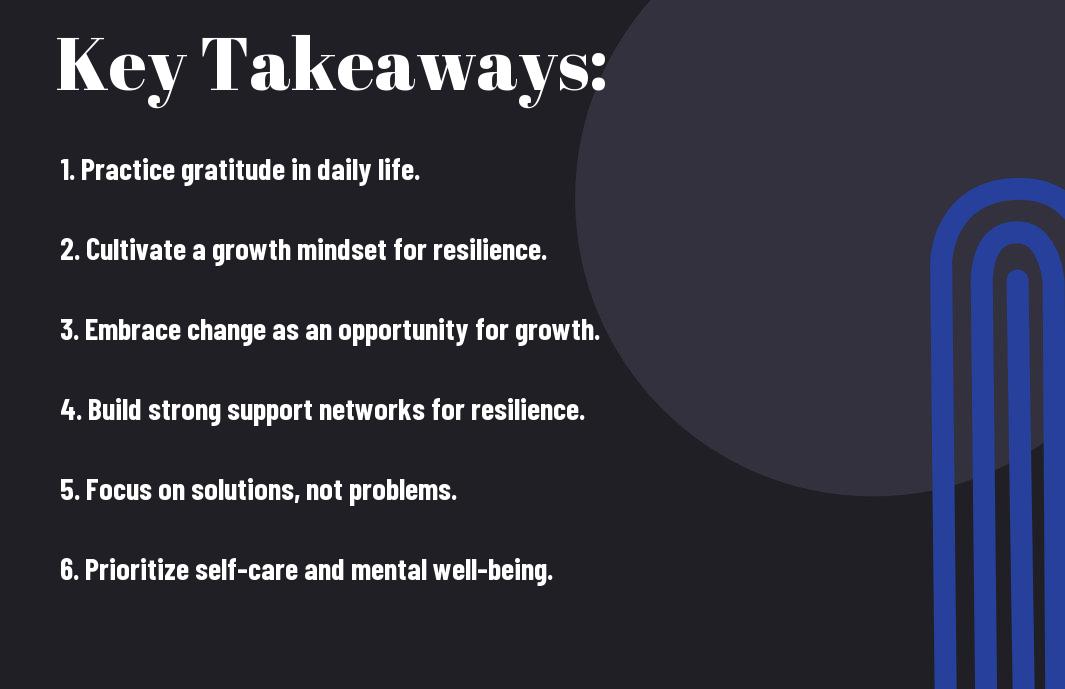Most challenges in life can test our resilience, but building a positive mindset is crucial for overcoming them. In challenging times, our mental outlook can make a significant difference in how we navigate difficulties and emerge stronger on the other side. This blog post will provide practical tips and strategies to help you develop resilience and cultivate a positive mindset when facing adversity. By focusing on mental strength and self-care techniques, you can better equip yourself to handle whatever challenges come your way.
Key Takeaways:
- Developing a Positive Mindset: Cultivating a positive mindset is essential for resilience in challenging times. It involves focusing on solutions rather than problems, practicing gratitude, and being mindful of self-talk.
- Building Emotional Resilience: Emotional resilience is the ability to adapt to and bounce back from adversity. Strategies like self-care, seeking support from others, and practicing emotional regulation can help build emotional resilience.
- Strengthening Mental Toughness: Mental toughness involves staying focused, determined, and motivated despite difficulties. Setting goals, maintaining a growth mindset, and developing coping strategies are important aspects of mental toughness.
- Practicing Self-Compassion: Being kind to oneself during challenging times is crucial for building resilience. Self-compassion involves treating oneself with understanding, forgiveness, and kindness, rather than self-criticism.
- Cultivating a Supportive Network: Surrounding oneself with a supportive network of friends, family, or professionals can provide invaluable assistance during tough times. Seeking help when needed and offering support to others can strengthen resilience.

Understanding Resilience
Obviously, to achieve resilience, it is essential to first understand the core concepts and psychological perspective that underpin this powerful trait.
Definition and Core Concepts
Resilience can be defined as the ability to adapt and bounce back in the face of adversity, trauma, tragedy, threats, or significant sources of stress. It involves the capacity to withstand and overcome challenging circumstances while maintaining a sense of control, purpose, and well-being.
Resilience is not just about toughing it out or having a stiff upper lip. It encompasses a range of skills and characteristics that are crucial for navigating life’s ups and downs. These core concepts include optimism, perseverance, self-efficacy, adaptability, and the ability to seek support when needed.
The Psychological Perspective of Resilience
On a psychological level, resilience is seen as a dynamic process that involves positive adaptation in the face of adversity. It is not a fixed trait but rather a set of skills and behaviors that can be developed and strengthened over time.
With a focus on promoting mental and emotional well-being, individuals can cultivate resilience through mindfulness practices, cognitive-behavioral therapy, self-care strategies, and cultivating a strong support network. Building resilience is crucial for not only surviving challenging times but also thriving in the face of adversity.
Strategies for Building Resilience
Keep Building Resilience in Challenging Times: Practical…
Developing a Positive Mindset
An essential aspect of building resilience is developing a positive mindset. This involves cultivating a mindset that focuses on optimism, gratitude, and self-compassion. By maintaining a positive outlook, individuals can better navigate through challenging times and bounce back from setbacks with resilience. Practicing positive affirmations and visualization techniques can help reinforce a positive mindset.
Coping Mechanisms and Problem-Solving Skills
The ability to develop coping mechanisms and problem-solving skills is vital for building resilience. When faced with adversity, individuals with strong coping mechanisms can effectively manage stress and adapt to difficult situations. Problem-solving skills enable individuals to identify challenges, evaluate solutions, and implement effective strategies to overcome obstacles.
Developing healthy coping mechanisms such as exercise, meditation, and connecting with a support network can enhance resilience. Additionally, honing critical thinking and decision-making skills can empower individuals to take proactive steps in managing challenging situations.
Resilience in Practice
Maintaining Resilience During Adversity
For individuals striving to maintain resilience during challenging times, it is crucial to focus on self-care and mental well-being. Acts of self-compassion in the face of adversity can significantly contribute to one’s ability to bounce back from setbacks. It is essential to acknowledge your emotions, seek support from loved ones or a mental health professional, and engage in activities that bring you joy and relaxation.
Moreover, practicing mindfulness and gratitude can help shift your perspective towards a more positive outlook. Mindfulness techniques, such as meditation and deep breathing exercises, can reduce stress and promote emotional regulation. Expressing gratitude for the small things in life can foster resilience by reminding you of the positive aspects even in challenging situations.
Long-term Resilience – Cultivating an Adaptive Lifestyle
Resilience is not just about bouncing back from difficulties but also developing long-term strategies to adapt to future challenges. Cultivating an adaptive lifestyle involves embracing change, fostering a growth mindset, and continuously learning and evolving. By setting realistic goals and maintaining a sense of purpose, individuals can navigate through obstacles with a sense of determination and resilience.
The key to long-term resilience lies in building strong support networks, nurturing meaningful relationships, and honing problem-solving skills. By surrounding yourself with positive influences and cultivating a proactive mindset, you can effectively navigate through life’s uncertainties and emerge stronger from adversity.
The journey towards long-term resilience is a continuous process that requires dedication, self-awareness, and a willingness to adapt to change. By prioritizing self-care, fostering positive relationships, and embracing challenges as opportunities for growth, individuals can cultivate an adaptive lifestyle that empowers them to thrive in the face of adversity.
Enhancing Resilience Through Support Systems
Not just surviving but thriving during tough times requires a robust support system that can provide the necessary assistance and encouragement. Support systems play a crucial role in building resilience and helping individuals navigate through challenges with greater strength.
The Role of Social Connections
Any individual facing adversities can benefit significantly from maintaining healthy social connections. Strong relationships with friends, family, or a supportive community can offer a sense of belonging, emotional support, and practical help when needed. Sharing your experiences and feelings with trusted individuals can alleviate stress and provide a fresh perspective on challenges.
Moreover, social connections can provide a source of motivation and inspiration, helping you stay optimistic and resilient in the face of adversity. Knowing that you are not alone and having people who believe in your abilities can boost your confidence and sense of empowerment, making it easier to overcome obstacles.
Seeking Professional Help When Needed
To ensure comprehensive support during challenging times, individuals should not hesitate to seek professional help when required. Trained therapists, counselors, or mental health professionals can offer specialized guidance and support to address complex emotional and psychological issues that may be hindering resilience.
Plus, professional help can provide access to effective coping strategies, tools for managing stress, and therapeutic interventions tailored to individual needs. Seeking help from a qualified professional can significantly enhance resilience by equipping individuals with the necessary skills to navigate difficulties and build a positive mindset for the future.
Summing up
On the whole, it is evident that building a positive mindset is crucial for achieving resilience in challenging times. By focusing on gratitude, self-care, growth mindset, and seeking support, individuals can strengthen their mental resilience and effectively navigate difficult situations. Developing a positive outlook can help in overcoming adversity, managing stress, and bouncing back stronger after setbacks. It is essential to practice these strategies consistently to cultivate a mindset that promotes emotional well-being and adaptability in the face of adversity. Embracing positivity and resilience can lead to personal growth, improved mental health, and a stronger ability to handle life’s challenges with grace and strength.
FAQ
Q: Why is building a positive mindset important in challenging times?
A: Building a positive mindset in challenging times is crucial as it helps individuals to navigate through difficulties with resilience and optimism. It enables individuals to cope better with stress, stay focused on solutions, and maintain a sense of hope amidst adversity.
Q: What are some strategies to build a positive mindset in challenging times?
A: Some strategies to build a positive mindset include practicing gratitude, engaging in positive self-talk, surrounding yourself with supportive people, setting realistic goals, and focusing on personal growth and learning from setbacks.
Q: How can resilience help in overcoming obstacles during tough times?
A: Resilience plays a key role in helping individuals overcome obstacles during tough times by providing the inner strength and fortitude to persevere in the face of adversity. It allows individuals to bounce back from setbacks, adapt to changes, and continue moving forward despite challenges.
Q: What impact does a positive mindset have on mental health?
A: A positive mindset has a significant impact on mental health as it can reduce stress, anxiety, and depression levels. It can improve overall well-being, enhance self-esteem, and promote a more optimistic outlook on life, leading to better mental health outcomes.
Q: How can one practice self-care to maintain a positive mindset in challenging times?
A: Practicing self-care is essential to maintain a positive mindset in challenging times. This includes getting enough rest, engaging in physical activity, eating a balanced diet, practicing mindfulness or relaxation techniques, and doing activities that bring joy and fulfillment.
Discover The Hidden Power of Your Thoughts. FREE Guide:
Receive self-improvement updates, start with this free guide today:
YES! I Want a Copy







